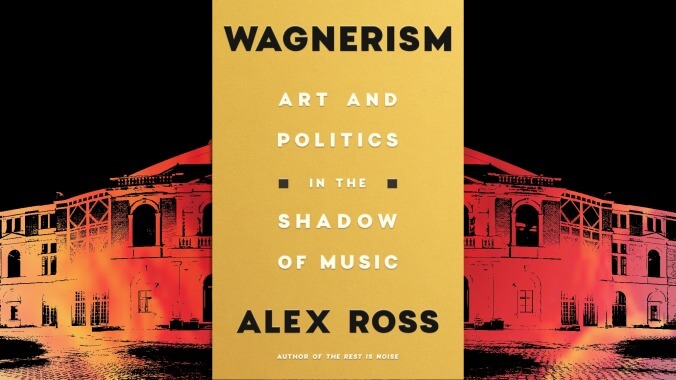With Wagnerism, Alex Ross complicates the image of fascism’s favorite composer

“Kill da wabbit, kill da wabbit…” For a certain generation of pop culture junkies, the first image that springs to mind when Richard Wagner comes up is Elmer Fudd, clad in shiny armor and horned helm, mangling “The Ride Of The Valkyries” as he operatically hunts (and lusts!) after his rabbit quarry. Perhaps instead one pictures a flock of U.S. military helicopters soaring over the Vietnamese coastline in Apocalypse Now, raining down bombs and bullets as the 19th-century composer’s most famous song drowns out both whirling blades and screaming bodies. Or maybe one’s mind leaps to Nazi Germany, where Wagner’s work was “the Muzak of genocide” as author Alex Ross calls it in his latest book, Wagnerism: Art And Politics In The Shadow Of Music, a dense and illuminating examination of Wagner’s influence on culture and history.
Wagner was the monoculture event artist of his age: a composer whose ambitious operas (which included Lohengrin, Parsifal, Tristan Und Isolde, and the four-part Ring cycle) introduced techniques and concepts that influenced culture across Europe and North America. In his 2007 book, The Rest Is Noise: Listening To The Twentieth Century, Ross, music critic for The New Yorker, touched briefly on Wagner’s influence on the world of music—detailing a lineage of avant-garde modern classical music that starts with Wagner acolytes Richard Strauss and Gustav Mahler. With Wagnerism, Ross traces the controversial composer’s influence across what the author calls the “artists of silence”: novelists, poets, and painters.
What makes Wagnerism such a challenging and rewarding read is how Ross comes to terms with that influence. Admitting his initial negative impressions of Wagner as “the Nosferatu shadow falling on that epoch,” Ross paints a picture of Wagner that complicates his image as fascism’s favorite composer. When Walt Whitman wrote, “Do I contradict myself? Very well, then I contradict myself,” he may as well have been talking about Wagner’s many philosophical about-faces.
Wagner associated with anarchists like Mikhail Bakunin and passionately made speeches about “perpetual revolution,” advocated for the dissolution of the aristocracy, and incorporated spiritual influences from Kabbalism, Islam, and Hinduism into his operatic stories about Grail quests and Nordic gods. Wagner was also an anti-Semite and a racist who praised the Civil War as “the only war whose aim was humane” for ending slavery and cheered the king of Zululand for defeating the British in the early parts of the Anglo-Zulu War. The man whose work would inspire the Third Reich once wrote “the desire to conquer other lands is ‘un-German’” and lived an androgynous, at-times campy lifestyle that would have doomed him as a decadent, depraved artist by that regime. Because of what Ross calls “the emphatic vagueness of his convictions,” entire groups who would have good reason to dismiss Wagner could still claim him as one of their own.
 Keep scrolling for more great stories.
Keep scrolling for more great stories.
